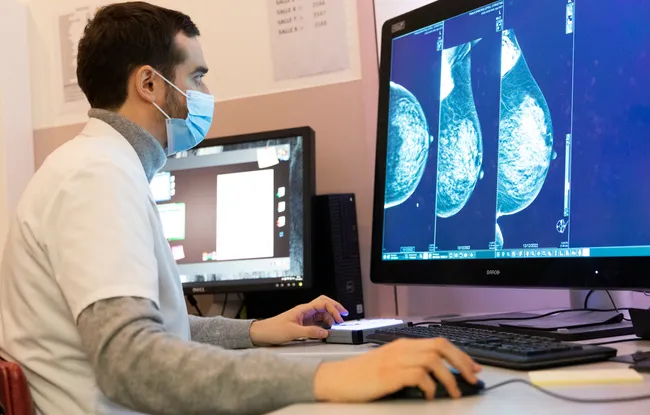- Home >
- Patients and Care >
- Cancer types >
- Breast cancer >
- Treatments
Breast cancer

- Definition
- Symptoms and diagnosis
- Treatments
- After breast cancer
- Support care
- Breast cancer research
- Medical team
- Clinical trials
Breast cancer treatments
In 80% of non-metastatic breast cancer cases, surgery is proposed as first-line treatment, combined with radiotherapy and chemotherapy, as well as possibly hormone therapy, immunotherapy and targeted therapies.
Breast cancer surgery
When cancer is diagnosed at an early stage, as is the case for 60% of patients thanks to organized screening, conservative surgery can be performed. Such surgeries, which account for 75% of breast cancer surgeries, entail removing only the tumor (known as a lumpectomy) and are generally performed on an outpatient basis.
If the cancer is at a more advanced stage, has spread throughout the breast or has multiple tumor sites, complete removal of the mammary gland (a mastectomy) may be necessary. Immediate reconstruction is usually proposed for aesthetic and psychological reasons.
Finally, for invasive cancers, the removal of the first lymph node in the lymphatic chain is performed to determine whether it is affected by cancer. If this is not the case, the lymph node chain will be preserved and if not, the doctors can choose to remove it completely or leave it and then treat it with chemotherapy and radiotherapy.
At Institut Curie, all patients who are referred for surgery benefit, in addition to a consultation with the surgeon, from a consultation with one of the department nurses. The nurse provides patients with details about the procedure, post-operative care, as well as explains the models of prostheses and suitable bras, etc. to reduce patients' apprehension as much as possible and answer all their questions.
Institut Curie is the European center treating the most breast cancers each year (7,000 patients), and it is at the forefront of surgical expertise, both in terms of anesthesia (hypnosis, loco-regional anesthesia, etc.) and breast reconstruction, for which each surgeon is trained in different techniques.
Radiotherapy for breast cancer
Radiotherapy may be used to destroy any tumor cells remaining after surgery. At Institut Curie, a quarter of breast cancer patients benefit from hypofractionation radiotherapy (which consists of administering the same dose of rays as during traditional radiotherapy, but in a reduced number of sessions) - a method that aims to be applied to all patients.
More information on radiotherapy
Chemotherapy for breast cancer
For cancers in situ, chemotherapy is recommended in order to limit the risks of local or metastatic relapse. When administered prior to surgery in certain cases, it also helps reduce the size of the tumor and possibly avoid a mastectomy. After an initial chemotherapy consultation with a nurse, the treatment is administered intravenously at the hospital or, depending on the type of cancer, at home. The patient is then referred for a follow-up consultation with a nurse for oral chemotherapy (Cisco).
Institut Curie is also working on setting up a day hospital for oral treatments, which will allow patients to meet several professionals on the same day (oncologist, nurse, pharmacist, dietician, psychologist, etc.) when treatment is started.
In certain situations, genomic tests make it possible to find out the characteristics of the tumor and to assess the individual risk of relapse. If such a risk is low, a therapeutic de-escalation is put in place, aimed at avoiding chemotherapy and its side effects.
More information on chemotherapy
Immunotherapy, hormone therapy, and targeted therapies in breast cancer
Depending on their state of health and the characteristics of their cancer, patients may also be prescribed targeted therapies (reconjugated antibodies, cell cycle inhibitors, PARP inhibitors, etc.), immunotherapy (only for triple negative breast cancer at the moment), or hormone therapy (to prevent relapse or in the case of metastatic cancer). Information conferences for patients on hormone therapy for breast cancer are regularly broadcast online by Institut Curie.
In some cases, and particularly when all the previous treatments have not worked, the institute's doctors offer patients to join a clinical trial. This access to innovation allows patients to benefit from new protocols in terms of treatment or quality of life and is one of the specific features of breast cancer care at the institute.
Patient pathways in senology at Institut Curie
Institut Curie offers a specific pathway for breast cancer patients in order to provide them with the best possible care while helping them avoid multiple trips and appointments, thus preserving their quality of life. Thanks to this, all the consultations necessary for implementing the treatment (surgeon, radiologist, specialized nurse, anesthetist, oncologist, etc.) are organized in two half-days, possibly three.
Another pathway, called PACOSME (specific announcement and coordination pathway for metastatic breast cancer), is dedicated to patients with metastatic breast cancer. Implemented with the institutional support of Pfizer, it is based on a consultation with a nurse, who takes stock of the patient's needs and expectations and then refers them to the institute's supportive care and therapeutic education workshops.
Institut Curie, the leading cancer center in France

- 50€
- 100€
- 150€
- 500€
- Montant libre
After tax deduction, your donation costs you 51.00€

